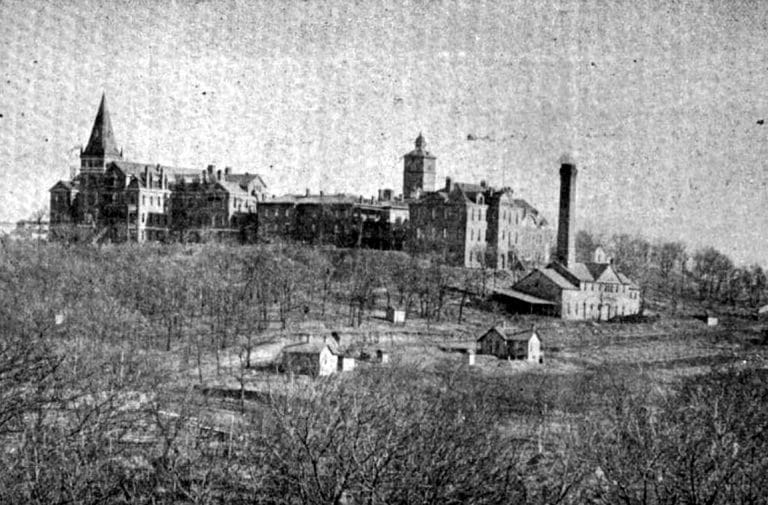“At Ames, Iowa,” he says, “we had to wait for the train and we went to a little hotel and they came about one o’clock and said : ‘Get ready for the train.’ I looked into mother’s face, and her eyes were red, her hair was disheveled. I said: ‘What’s the matter mother?’ All the time Ed and I slept. Mother had been praying.
“We went to the train ; she put one arm about me and the other about Ed and sobbed as if her heart would break. People walked by and looked at us, but they didn’t say a word. Why? They didn’t know, and if they did, they wouldn’t have cared. Mother knew. She knew that for five years she wouldn’t see her boys. We got into the train and said ‘Good-bye mother,’ as the train pulled out. “We reached Council Bluffs. It was cold and we turned our little thin coats around our necks and shivered. We saw a hotel and went up and asked a lady for something to eat. She said: ‘What’s your name?’
” ‘My name’s Willie Sunday and this is my brother Ed.’
” ‘Where are yon going?’ ” ‘Going to the Soldiers’ Orphans’ home at Glenwood,’ I said. “She wiped her tears and said: ‘My husband was a soldier and never came back. He wouldn’t turn anyone away, and I wouldn’t turn you boys away.’ She threw her arms about us and said : ‘Come on in.’ She gave us our breakfast and our dinner, too. There wasn’t any train going out on the ‘Q’ until afternoon. We played around the freight yards. We saw a freight train standing there, so we climbed into the caboose.
“The conductor came along and said : “‘Where is your money?’ ‘Ain’t got any.”” ‘Where is your ticket ?’ ‘Ain’t got any ticket.’ You can’t ride without money or tickets, I’ll have to put you off.’ “We commenced to cry. My brother handed him a letter of introduction to the superintendent of the orphans’ home. The conductor read it, handed it back as the tears
rolled down his cheeks. Then he said : “Just sit still, boys. It won’t cost you a cent to ride on my train.’
“It’s only 20 miles from Council Bluffs to Glenwood, and, as we rounded the curve, the conductor said : ‘There it is on the hill.’ We went there and stayed for years.”
The institution at Glenwood was conducted by the state and was subsequently used for other purposes than an orphans’ home. All the children were transferred to the newer institution at Davenport.F. J. Sessions, Superintendent of the Soldiers’ Orphans’ Home, at Davenport, says: “Howard E. and William A. Sunday were admitted to this institution by transfer from the Glenwood, Iowa, Soldiers’ Orphans’ Home when the latter was closed January 29, 1875. They were admitted to the Glenwood institution September 25, 1874. Dismissed from this institution June 10, 1876. The records says to go home, but place is not located.
Woman’s Soldiers’ Aid Societies
“Jesus took little children in his arms and blessed them and said: ‘Of such is the Kingdom of Heaven’. Let us therefore remember the orphan children of our soldiers and offer to the Father on that day a tribute of gratitude that will be pleasing in His sight.
“The ladies of Iowa have resolved to erect a temple in honor of its heroic dead who have fallen in defense of liberty, and to make it an asylum, a home for its orphan children, where they may be properly cared for and educated. They call upon all the people of Iowa of every denomination and party to aid in this great work.
From Robert J Morgan:
This man was born in 1862 outside Ames, Iowa, in a little log cabin with rough boards for a floor. This is during the Civil War, and Billy never saw nor knew his father. The elder Sunday, William, was a contractor and brick mason. He enlisted in the Union Army. While fording a river, he became wet to the skin, contracted a severe cold, and died from pneumonia during the war. He was buried at Camp Patterson in Missouri.
The young widow, Mary, tried to raise her new baby and his older brother, Ed, but it was a hard prairie life. Billy grew up milking cows, cutting wood, building fences, and riding horses. Despite her best efforts, Mrs. Sunday couldn’t provide for her boys, and at length she sent them to the Soldiers’ Orphans’ Home at Glenwood, Iowa. Billy later recalled how she took them to the train station, her eyes red with tears, and put them on the train without being able to give them enough money for the ticket. A kind railroad man, touched by their story, let them ride for free.
Related
Sorry, no records were found. Please adjust your search criteria and try again.
Sorry, unable to load the Maps API.
